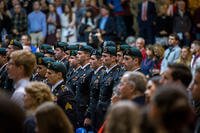The 6,500 black women who signed on with the Women's Army Auxiliary Corps during World War II found that willingness to serve did not mean equal opportunity to do so: some women were relegated to positions as glorified housekeepers. First Officer Harriet M. West, as she was then known, was criticized for remaining in uniform while her sister soldiers suffered. In a 1943 radio broadcast, Waddy addressed her detractors, saying that joining a segregated military "which does not represent an ideal of democracy" was not "a retreat from our fight" but a contribution to realizing the ideal.
Waddy's career spanned a quarter century of our country’s years of segregation, beginning with the completion of her WAC training at Fort Des Moines, Iowa. She was one of only two African-American women to attain the rank of major in the WACs during World War II.
Once promoted to that rank and named an aide to WAC director Col. Oveta Culp Hobby, Waddy was able to take an active role in changing the status of "colored" women in the military. She became an advisor to the Army on racial issues. Her 1930s experience working for Bureau of Negro Affairs director Mary McLeod Bethune convinced her that participation in all aspects of national affairs was the only route to full acceptance for all African-Americans.
Harriet West was born in Jefferson City, Mo., in 1904 as Harriet M. Hardin. Brought up by her maternal grandmother, she graduated from Kansas State College of Agriculture and Applied Science. During her WAC service, she graduated from The Adjutant General’s School of the Army and was placed in charge of 50 civilian typists; it was Waddy’s responsibility to see that letters were written to notify families of soldiers who were killed, wounded, or missing in action.
Although married four times, Waddy never had any children. She was famously independent and relished the different places and faces her Army assignments involved. She was promoted to lieutenant colonel in 1948, and retired from active duty in 1952. A longtime resident of Eugene, Ore., she worked for the Federal Aviation Administration and volunteered at a Job Corps Center. The 94-year-old Waddy died at the home of friends in Las Vegas, Nev., in 1999.
Related links:















